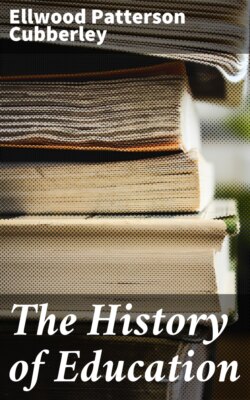Читать книгу The History of Education - Ellwood Patterson Cubberley - Страница 37
На сайте Литреса книга снята с продажи.
QUESTIONS ON THE READINGS
Оглавление1. Give reasons why the Laws of the Twelve Tables (12) were considered of such fundamental importance (13) in the education of the early Roman boy? How do you explain their being supplanted later by the Latinized Odyssey?
2. What does the Farmer's Calendar (14) reveal as to the character of Roman life?
3. Contrast the Roman character (15, 16) with that of the Athenian.
4. Compare the education of a Roman matron, as revealed by the epitaph (17), with that of a girl in later American colonial times.
5. After reading Marcus Aurelius (18) and Tacitus (19), what is your judgment as to the relative merits of the old and the new education: (a) as a means of training youths? (b) as adapted to the changed conditions of Imperial Rome?
6. How do you account for the attempts of the conservative officials of the State to prohibit the introduction of Greek higher schools (20 a-b) proving so unsuccessful?
7. Compare the difficulties involved in learning to read Greek (Fig. 6) and Latin (21). Either and English.
8. What type of higher educational advantages does the selection from Horace (22) indicate as prevailing in Roman cities? Compare with present- day advanced education.
9. What do Martial's Epigrams to the Roman schoolmasters (23 a-b) indicate as to the nature of the schools, school discipline, and social status of the Roman primary teacher?
10. Do the selections from Cicero (24) and Quintilian (25) satisfy you that oratory was a sufficiently broad idea for the higher education of youths under the Empire? Why?
11. What does the decree of Constantine (26) indicate as to the social status of the higher teachers under the Empire?
